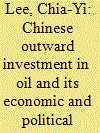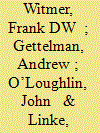| Srl | Item |
| 1 |
ID:
142201


|
|
|
|
|
| Summary/Abstract |
Due to the rising demand for oil, China has been actively investing abroad in oil producing countries. This paper examines the impact of Chinese oil investment, focusing on the economic and political effects in the recipient countries in the developing world. By building on the existing FDI literature, I argue that the presence of Chinese oil investment may be helpful to the recipient countries’ economies but harmful to the quality of governance. The case studies of Sudan and Chad illustrate this dilemma. Using quantitative data on Chinese oil investment and on economic and political development, I find that in countries where Chinese oil investment is present, the economy is growing faster, but the level of corruption is heightened and the level of political accountability is reduced. Western oil investment also has a helpful economic effect, but does not carry a harmful political effect.
|
|
|
|
|
|
|
|
|
|
|
|
|
|
|
|
| 2 |
ID:
120137


|
|
|
|
|
| Publication |
2013.
|
| Summary/Abstract |
Compulsory rules are known to have far-reaching effects beyond boosting electoral participation rates. This article examines the relationship between compulsory voting and partisan attachments. A theory of attachment formation and strength is engaged that argues that compulsory voting boosts the likelihood that one will identify with a party and, in turn, the strength of party attachments among identifiers. The statistical model accounts for both the hierarchical structure of the data (individuals in elections) and the dual nature of the dependent variable (individuals report a strength of attachment only for the party with which they identify). Using data from the Comparative Study of Electoral Systems, it is demonstrated that compulsory voting does indeed increase both the incidence and the strength of partisanship.
|
|
|
|
|
|
|
|
|
|
|
|
|
|
|
|
| 3 |
ID:
152297


|
|
|
|
|
| Summary/Abstract |
How will local violent conflict patterns in sub-Saharan Africa evolve until the middle of the 21st century? Africa is recognized as a particularly vulnerable continent to environmental and climate change since a large portion of its population is poor and reliant on rain-fed agriculture. We use a climate-sensitive approach to model sub-Saharan African violence in the past (geolocated to the nearest settlements) and then forecast future violence using sociopolitical factors such as population size and political rights (governance), coupled with temperature anomalies. Our baseline model is calibrated using 1° gridded monthly data from 1980 to 2012 at a finer spatio-temporal resolution than existing conflict forecasts. We present multiple forecasts of violence under alternative climate change scenarios (optimistic and current global trajectories), of political rights scenarios (improvement and decline), and population projections (low and high fertility). We evaluate alternate shared socio-economic pathways (SSPs) by plotting violence forecasts over time and by detailed mapping of recent and future levels of violence by decade. The forecasts indicate that a growing population and rising temperatures will lead to higher levels of violence in sub-Saharan Africa if political rights do not improve. If political rights continue to improve at the same rate as observed over the last three decades, there is reason for optimism that overall levels of violence will hold steady or even decline in Africa, in spite of projected population increases and rising temperatures.
|
|
|
|
|
|
|
|
|
|
|
|
|
|
|
|